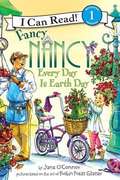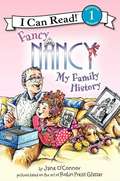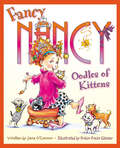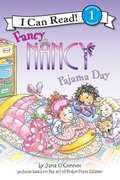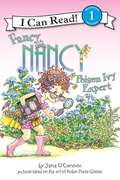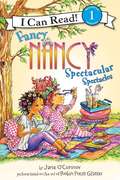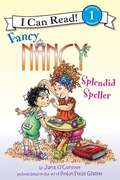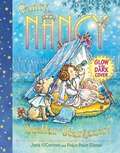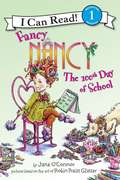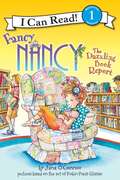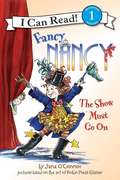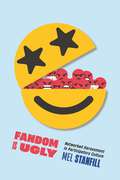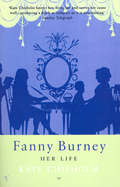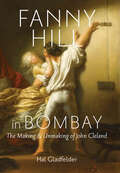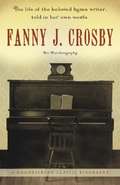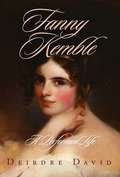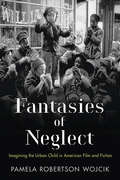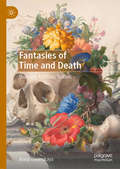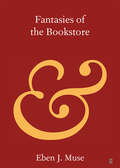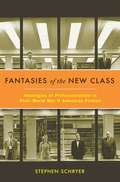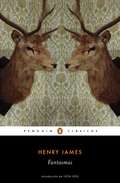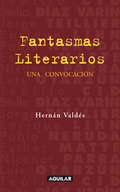- Table View
- List View
Fancy Nancy: Every Day Is Earth Day (I Can Read! #Level 1)
by Jane O'ConnorBeing green is important to Nancy--so important that she wants her family to take care of the Earth morning, noon, and night!
Fancy Nancy: My Family History (I Can Read! #Level 1)
by Jane O'Connor Robin Preiss GlasserNancy wants to do an interesting school report on her ancestor. (That's fancy for a family member who lived long ago.) But will she remember to stick to the plain truth?
Fancy Nancy: Oodles of Kittens (Fancy Nancy)
by Jane O'Connor*NOW A HIT TV SERIES ON DISNEY JUNIOR*Fancy Nancy returns in a purr-fect story about felines, canines, and making new four-legged friends! From the dazzling New York Times bestselling duo Jane O’Connor and Robin Preiss Glasser. It’s raining, and Nancy hears a strange sound coming from outside. Nancy and Bree decide to investigate, and what do they find? Lo and behold! It’s oodles of adorable kittens! (Oodles is fancy for a lot.)After finding some of the kittens good homes, Nancy and Bree each get to keep one for themselves. That’s until Nancy’s new kitten meets her posh pup, Frenchy. Will Nancy’s two pets ever get along? Will Nancy be able to love them both the same?Perfect for fans of the Eloise, Olivia, and other Fancy Nancy books.Ooh la la! Fancy Nancy is starring in her own fabulous TV show on Disney Junior. READ THE BOOKS THAT STARTED IT ALL!Fancy NancyFancy Nancy and the Posh PuppyFancy Nancy: Bonjour, ButterflyFancy Nancy: Splendiferous ChristmasFancy Nancy and the Fabulous Fashion BoutiqueFancy Nancy and the Mermaid BalletFancy Nancy: Fanciest Doll in the UniverseFancy Nancy and the Wedding of the CenturyFancy Nancy 10th Anniversary EditionFancy Nancy: Saturday Night SleepoverFancy Nancy: Oodles of Kittens
Fancy Nancy: Pajama Day (I Can Read! #Level 1)
by Jane O'ConnorNancy is all set to wear something special for Pajama Day at school. But when Bree and Clara show up in matching outfits, Nancy feels left out. Will this Pajama Day be as fun as she thought?
Fancy Nancy: Poison Ivy Expert (I Can Read! #Level 1)
by Jane O'Connor<P>When Nancy picks flowers for Ms. Glass's surprise party, she is overjoyed--until she discovers an unpleasant surprise of her own! How could Nancy, practically a poison ivy expert, come down with something so unfancy? <P>In this hilarious new addition to the Fancy Nancy I Can Read series, Nancy realizes that even experts can always learn something new. With her boundless spirit and dynamic flair, Nancy is sure to leave young readers itching for more!
Fancy Nancy: Spectacular Spectacles (I Can Read! #Level 1)
by Jane O'Connor<P>Nancy thinks that Bree's new glasses are simply spectacular. After all, they are lavender. They are glittery. And best of all, they come in a silver case. So when Bree tells Nancy all about her trip to the eye doctor, Nancy can't help but wonder if her own eyesight is perhaps getting a little blurry too . . . . <P>With a glossary of Fancy Nancy's Fancy Words in the back, this addition to the Fancy Nancy I Can Read series is sure to delight young readers everywhere!
Fancy Nancy: Splendid Speller (I Can Read! #Level 1)
by Jane O'ConnorWhere spelling is concerned, Nancy is better than great--she's splendid! But when Ms. Glass's spelling test is harder than Nancy anticipated, the self-professed spelling prodigy faces a tough decision.
Fancy Nancy: Stellar Stargazer! (I Can Read!)
by Jane O'Connor<P> Fancy Nancy thinks that everything in the sky is simply stellar, from the sun and the moon to the stars -and their constellations (that's 'a fancy word for the shapes that stars make!). So nothing could make her happier than a special sleepover under the stars with her dad and her little sister, JoJo. <P>Together Nancy and JoJo wish on stars, moon bathe, and even eat astronaut ice cream! But when rain clouds cover up the stars, what's a stellar stargazer to do? <P>Picture descriptions present.
Fancy Nancy: The 100th Day of School (I Can Read! #Level 1)
by Jane O'ConnorWith the 100th day of school just around the corner, Nancy finds herself utterly stumped. She can't think of anything exciting, special, or imaginative enough to bring in to class to commemorate the day. Just as Nancy begins to lose hope, she finds inspiration from an unexpected source--and learns that even sad events can bring with them a glimmer of beauty.
Fancy Nancy: The Dazzling Book Report (I Can Read! #Level 1)
by Jane O'Connor<P>Nancy is determined to make the cover of her very first book report as fancy as she can, but she spends so much time on it that she has no time to write about the book.
Fancy Nancy: The Show Must Go On (I Can Read! #Level 1)
by Jane O'Connor<P> Nancy has her act for the school's talent show all planned out: She and Bree will do an absolutely stupendous song-and-dance number together. But when Ms. Glass assigns partners for the show, Nancy gets paired up with Lionel. He's the shyest boy in class! Will Nancy and Lionel be able to work together to perform one marvelous act? Or will the show go on without them? <P>The simple text and vivid illustrations in this newest Fancy Nancy I Can Read are sure to have readers everywhere crying, "Encore!"
Fandom Is Ugly: Networked Harassment in Participatory Culture (Critical Cultural Communication #47)
by Mel StanfillHighlights the importance of considering contemporary public culture through the lens of fan studiesThe Gamergate harassment campaign of women in video games, the “Unite the Right” rally where hundreds of Confederate monument supporters cried out racist and antisemitic slurs in Charlottesville, and the targeted racist and sexist harassment of Star Wars’ Asian American actress Kelly Marie Tran all have one thing in common: they demonstrate the collective power and underlying ugliness of fandoms. These fans might feel victimized or betrayed by the content they’ve intertwined with their own identities, or they may simply feel that they’re speaking truth to power. Regardless, by connecting via social media, they can unleash enormous amounts of hate, which often results in severe real-world consequences.Fandom Is Ugly argues that reactionary politics and media fandoms go hand in hand, and to understand one, we need to understand the other. Mel Stanfill pushes back on two mainstream assumptions: that media and the pleasure of consumption are frivolous and unworthy of study, and that fandoms are inherently progressive. Drawing on a corpus of angry social media posts, Fandom Is Ugly finds that ugly moments happen when deep emotional attachments collide with social structures and situations that have been misunderstood. By holistically examining the forms of ugly fandom in cases that touch upon race, gender, and sexuality, Fandom Is Ugly produces a comprehensive theory of the negative sides of fan attachments.
Fanny Burney: Her Life
by Kate ChisholmFanny Burney (1752-1840) is best known as the author of EVELINA, one of the most engaging novels of the eighteenth century. But for much of her long life, she was also an incomparable diarist, witnessing both the madness of George III and the young Queen Victoria's coronation. To read the journals she kept from the age of sixteen is to step back into Georgian England, meeting Dr Johnson, Garrick and Reynolds, being chased round the gardens of Kew Palace by the King. . . She was lady-in-writing to Queen Charlotte; she married an aristocratic emigre from the French Revolution and had her first and only child when she was forty-two; she was in Paris as Napoleon's armies marshalled against England, and in Brussels she heard the muffled guns, and watched the wounded being carried back from Waterloo. Kate Chisholm's delightful biography, incorporating the latest research and illustrate with unusual portraits and drawings, is lively, funny, shocking, informative and deeply moving; it paints a vivid portrait of a woman of great talent, against the changing background of England and France, a culture and an age.
Fanny Hill in Bombay: The Making & Unmaking of John Cleland
by Hal GladfelderA study of the life and work of the notorious English novelist.John Cleland is among the most scandalous figures in British literary history, both celebrated and attacked as a pioneer of pornographic writing in English. His first novel, Memoirs of a Woman of Pleasure, or Fanny Hill, is one of the enduring literary creations of the eighteenth century, despite over two hundred years of legal prohibition. Yet the full range of his work is still too little known.In this study, Hal Gladfelder combines groundbreaking archival research into Cleland’s tumultuous life with incisive readings of his sometimes extravagant, sometimes perverse body of work, positioning him as a central figure in the development of the novel and in the construction of modern notions of authorial and sexual identity in eighteenth-century England.Rather than a traditional biography, Fanny Hill in Bombay presents a case history of a renegade authorial persona, based on published works, letters, private notes, and newly discovered legal testimony. It retraces Cleland’s career from his years as a young colonial striver with the East India Company in Bombay through periods of imprisonment for debt and of estrangement from collaborators and family, shedding light on his paradoxical status as literary insider and social outcast.As novelist, critic, journalist, and translator, Cleland engaged with the most challenging intellectual currents of his era yet at the same time was vilified as a pornographer, atheist, and sodomite. Reconnecting Cleland’s writing to its literary and social milieu, this study offers new insights into the history of authorship and the literary marketplace and contributes to contemporary debates on pornography, censorship, the history of sexuality, and the contested role of literature in eighteenth-century culture.“Cleland’s life story is a puzzle with many pieces still missing. But Gladfelder’s careful, painstaking reconstructions have brought the fascinating picture into much clearer focus.” —Choice“Anyone interested in the history of pornography or Cleland cannot afford to be without this study of the writer and his work.” —Julie Peakman, Times Literary Supplement (UK)“Innovative, adventurous, and exciting. Gladfelder has given us a new and, for eighteenth-century studies, a newly significant and central John Cleland—a writer whose notoriety as author of the first pornographic novel in English has until now overshadowed a long, varied, and remarkable career as colonial administrator, projector, jailbird, bookseller’s hack, alleged sodomite, translator, reviewer, philologist, and author of numerous original works beyond the Memoirs. . . . An exemplary—an unusual and immensely enabling—combination of painstaking archival and other historical research and analytic, expository flair. The scholarship is formidable throughout.” —Thomas Keymer, University of Toronto
Fanny Hill in Bombay: The Making and Unmaking of John Cleland
by Hal GladfelderJohn Cleland is among the most scandalous figures in British literary history, both celebrated and attacked as a pioneer of pornographic writing in English. His first novel, Memoirs of a Woman of Pleasure, or Fanny Hill, is one of the enduring literary creations of the eighteenth century, despite over two hundred years of legal prohibition. Yet the full range of his work is still too little known.In this study, Hal Gladfelder combines groundbreaking archival research into Cleland’s tumultuous life with incisive readings of his sometimes extravagant, sometimes perverse body of work, positioning him as a central figure in the development of the novel and in the construction of modern notions of authorial and sexual identity in eighteenth-century England.Rather than a traditional biography, Fanny Hill in Bombay presents a case history of a renegade authorial persona, based on published works, letters, private notes, and newly discovered legal testimony. It retraces Cleland’s career from his years as a young colonial striver with the East India Company in Bombay through periods of imprisonment for debt and of estrangement from collaborators and family, shedding light on his paradoxical status as literary insider and social outcast.As novelist, critic, journalist, and translator, Cleland engaged with the most challenging intellectual currents of his era yet at the same time was vilified as a pornographer, atheist, and sodomite. Reconnecting Cleland’s writing to its literary and social milieu, this study offers new insights into the history of authorship and the literary marketplace and contributes to contemporary debates on pornography, censorship, the history of sexuality, and the contested role of literature in eighteenth-century culture.
Fanny J. Crosby: An Autobiography (Hendrickson Classic Biographies Series)
by Fanny J. CrosbyThe memoirs and observations of the composer of over eight thousand hymns. Stories from her entire life from her blindness as an infant through her old age. Fanny Crosby was friends with famous people the world over including several presidents. She tells her story with love and compassion.
Fanny Kemble
by Deirdre DavidA ForeWord magazine Book of the Year for 2007Charismatic, highly intelligent, and splendidly talented, Fanny Kemble (1809-93) was a Victorian celebrity, known on both sides of the Atlantic as an actress and member of the famous Kemble theatrical dynasty, as a fierce opponent of slavery despite her marriage to a wealthy slave owner, as a brilliantly successful solo performer of Shakespeare, and as the author of journals about her career and life on her husband's Georgia plantations. She was, in her own words, irresistible as a "woman who has sat at dinner alongside Byron . . . and who calls Tennyson, Alfred."Touring in America with her father in the early 1830s, Kemble impulsively wed the wealthy and charming Philadelphia bachelor Pierce Butler, beginning a tumultuous marriage that ended in a sensational divorce and custody battle fourteen years later. At the time of their marriage, Kemble had not yet visited the vast Georgia rice and cotton plantations to which Butler was heir. In the winter of 1838, they visited Butler's southern holdings, and a horrified Kemble wrote what would later be published on both sides of the Atlantic as Journal of a Residence on a Georgian Plantation. An important text for abolitionists, it revealed the inner workings of a plantation and the appalling conditions in which slaves lived. Returning to England after her divorce, she fashioned a new career as a solo performer of Shakespeare's plays and as the author of memoirs, several travel narratives and collections of poems, a short novel, and miscellaneous essays on the theater. For the rest of her life, she would divide her time between the two countries.In the various roles she performed in her life, on stage and off--abolitionist, author, estranged wife--Kemble remained highly theatrical, appropriating and subverting nineteenth-century prescriptions for women's lives, ever rewriting the roles to which she was assigned by society and inheritance. Hers was truly a performed life, and in the first Kemble biography in twenty-five years to examine that life in its entirety, Deirdre David presents it in all its richness and complexity.
Fantasies of Neglect
by Pamela Robertson WojcikIn our current era of helicopter parenting and stranger danger, an unaccompanied child wandering through the city might commonly be viewed as a victim of abuse and neglect. However, from the early twentieth century to the present day, countless books and films have portrayed the solitary exploration of urban spaces as a source of empowerment and delight for children. Fantasies of Neglect explains how this trope of the self-sufficient, mobile urban child originated and considers why it persists, even as it goes against the grain of social reality. Drawing from a wide range of films, children's books, adult novels, and sociological texts, Pamela Robertson Wojcik investigates how cities have simultaneously been demonized as dangerous spaces unfit for children and romanticized as wondrous playgrounds that foster a kid's independence and imagination. Charting the development of free-range urban child characters from Little Orphan Annie to Harriet the Spy to Hugo Cabret, and from Shirley Temple to the Dead End Kids, she considers the ongoing dialogue between these fictional representations and shifting discourses on the freedom and neglect of children. While tracking the general concerns Americans have expressed regarding the abstract figure of the child, the book also examines the varied attitudes toward specific types of urban children--girls and boys, blacks and whites, rich kids and poor ones, loners and neighborhood gangs. Through this diverse selection of sources, Fantasies of Neglect presents a nuanced chronicle of how notions of American urbanism and American childhood have grown up together.
Fantasies of Neglect: Imagining the Urban Child in American Film and Fiction
by Pamela Robertson WojcikIn our current era of helicopter parenting and stranger danger, an unaccompanied child wandering through the city might commonly be viewed as a victim of abuse and neglect. However, from the early twentieth century to the present day, countless books and films have portrayed the solitary exploration of urban spaces as a source of empowerment and delight for children. Fantasies of Neglect explains how this trope of the self-sufficient, mobile urban child originated and considers why it persists, even as it goes against the grain of social reality. Drawing from a wide range of films, children's books, adult novels, and sociological texts, Pamela Robertson Wojcik investigates how cities have simultaneously been demonized as dangerous spaces unfit for children and romanticized as wondrous playgrounds that foster a kid's independence and imagination. Charting the development of free-range urban child characters from Little Orphan Annie to Harriet the Spy to Hugo Cabret, and from Shirley Temple to the Dead End Kids, she considers the ongoing dialogue between these fictional representations and shifting discourses on the freedom and neglect of children. While tracking the general concerns Americans have expressed regarding the abstract figure of the child, the book also examines the varied attitudes toward specific types of urban children--girls and boys, blacks and whites, rich kids and poor ones, loners and neighborhood gangs. Through this diverse selection of sources, Fantasies of Neglect presents a nuanced chronicle of how notions of American urbanism and American childhood have grown up together.
Fantasies of Time and Death: Dunsany, Eddison, Tolkien
by Anna VaninskayaThis book reveals the unique contribution made by the three founding fathers of British fantasy—Lord Dunsany, E. R. Eddison and J. R. R. Tolkien—to our culture’s perennial reassessment of the meanings of time, death and eternity. It traces the poetic, philosophical and theological roots of the striking preoccupation with mortality and temporality that defines the imagined worlds of early fantasy fiction, and gives both the form of such fiction and its ideas the attention they deserve. Dunsany, Eddison and Tolkien raise some of the oldest questions in existence: about the limits of nature, human and divine; cosmic creation and destruction; the immortality conferred by art and memory; and the paradoxes and uncertainties generated by the universal experience of transience, the fear of annihilation and the desire for transcendence. But they respond to those questions by means of thought experiments that have no precedent in modern literary history.
Fantasies of the Bookstore (Elements in Publishing and Book Culture)
by Eben J. MuseThis Element surveys the place of the bookstore in the creative imagination (the fantasies of the bookstore) through a study of novels in which bookstores play a prominent role in the setting or plot. Nearly 500 'bookstore novels' published since the first in 1917 have been identified. The study borrows the concept of 'meaningful locations' from the field of human geography to assess fictional bookstores as narrative events rather than static backgrounds. As a meaningful location, the bookstore creates the potential for events that can occur both within the place of the store and in the wider space within which it functions. Elements of the narrative space include its spatio-temporal location, its locale or composition, and the events which these elements generate to define the bookstore's sense of place.
Fantasies of the New Class: Ideologies of Professionalism in Post-World War II American Fiction
by Stephen SchryerLinking literary and historical trends, Stephen Schryer underscores the exalted fantasies that arose from postwar American writers' new sense of their cultural mission. Hoping to transform capitalism from within, writers and critics tried to cultivate aesthetically attuned professionals who could disrupt the narrow materialism of the bourgeoisie.
Fantasies of the New Class: Ideologies of Professionalism in Post–World War II American Fiction
by Stephen SchryerAmerica's post–World War II prosperity created a boom in higher education, expanding the number of university-educated readers and making a new literary politics possible. Writers began to direct their work toward the growing professional class, and the American public in turn became more open to literary culture. This relationship imbued fiction with a new social and cultural import, allowing authors to envision themselves as unique cultural educators. It also changed the nature of literary representation: writers came to depict social reality as a tissue of ideas produced by knowledge elites.Linking literary and historical trends, Stephen Schryer underscores the exalted fantasies that arose from postwar American writers' new sense of their cultural mission. Hoping to transform capitalism from within, writers and critics tried to cultivate aesthetically attuned professionals who could disrupt the narrow materialism of the bourgeoisie. Reading Don DeLillo, Marge Piercy, Mary McCarthy, Saul Bellow, Ursula K. Le Guin, Ralph Ellison, and Lionel Trilling, among others, Schryer unravels the postwar idea of American literature as a vehicle for instruction, while highlighting both the promise and flaws inherent in this vision.
Fantasmas
by Henry JamesLos mejores libros jamás escritos. «Si no puedes creer en ellos, no los molestes...» Si bien Henry James fue un refinado prosista de dramas costumbristas, no menos notable es su aportación al ámbito de la intriga y el suspense. Profundamente interesado en el terreno de lo sobrenatural, no dejó sin explorar ningún tipo de experiencia extrasensorial, ni se abstuvo de analizar al detalle los demonios que, en cualesquiera formas, perturban al ser humano. Este volumen recoge el grueso de su narrativa breve fantástica y fantasmagórica. Precede a los relatos el magistral estudio de Leon Edel -considerado unánimemente el mayor especialista en la obra de James del siglo XX-, quien también redactó una minuciosa nota preliminar para cada uno de ellos. Como colofón, reproducimos el ensayo del propio James «¿Hay vida después de la muerte?», que refleja las inquietudes del autor sobre el más allá. Reseña:«Aél le interesa el drama psicológico, el desgarro o la epifanía, de ahí tantas adaptaciones al cine.»Núria Escur, La Vanguardia «Henry James siempre es inspirador y decididamente contemporáneo. Jaume Bonfill, de Penguin Clásicos afirma que su relevancia no solo es histórica, ya que tiene "recursos y sorpresas que los lectores de hoy siguen percibiendo como novedosos, y que asimismo aún ponen en práctica, por ejemplo, los guionistas de cine o televisión".»Ana Llurba, Letras Libres
Fantasmas literarios
by Hernán ValdésEl mundo literario chileno de los años 50 a los 70 tras bambalinas a través de la mirada de un testigo privilegiado. Hernán Valdés, el autor de Tejas Verdes, convoca a varias generaciones de literatos y sus mundos literarios -los fantasmas-, y nos conduce por una aventura novelesca en la que sus vidas, esto es su cultura, ideas, pasiones y andanzas, aparecen ante nosotros en su inmediato acontecer, en su presente, en las décadas del 50, 60 y 70: pobreza, sueños y amoríos; grandezas y flaquezas en las vidas de Jorge Teillier, Teófilo Cid, Stella Díaz Varín, Enrique Lihn, Pablo Neruda, Esther Matte, Nicanor Parra y los demás.Algunos podrán leer este libro como un documento novelado, otros, como una novela documental. En cualquier caso, la experiencia será la de una inmersión en una forma de vida, en un mundo de valores estéticos y morales que hoy en día parecen idos y cuya nostalgia se acrecienta. Con el lenguaje poético, la lucidez y la ironía que han caracterizado sus anteriores escritos, Valdés ofrece un emotivo y revelador ejercicio de la memoria. Por estas páginas desfilan con toda su humanidad los fantasmas vivos y muertos de un escritor que a fuerza de vivir tantos años lejos de Chile, ha llegado a convertirse él mismo en un fantasma.
